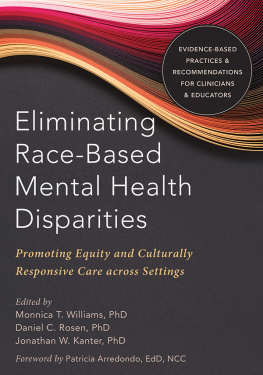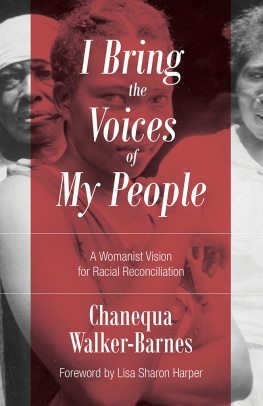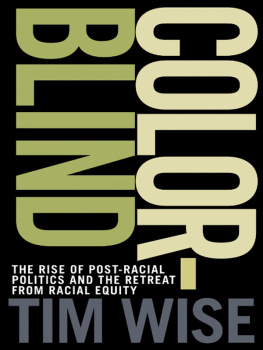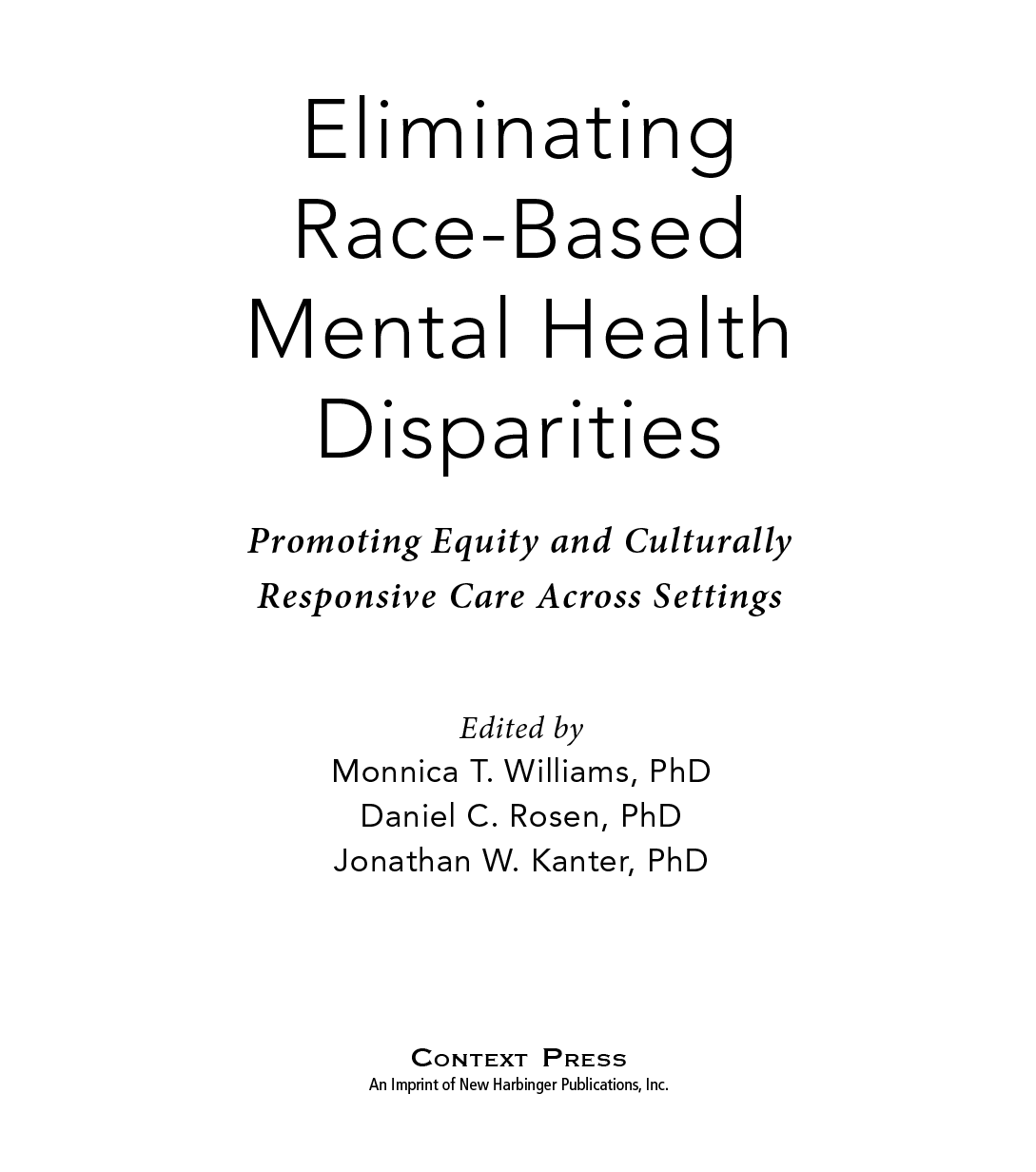Eliminating Race-Based Mental Health Disparities does an excellent job of addressing the impacts of racism on the mental health of people-of-color communities. The editors did an excellent job of speaking to the need for self-reflection, cultural humility, and interrogating ones privilege in the context of mental health care. I would highly recommend this book as a primer for all clinicians, researchers, and trainees in the social sciences.
Sand Chang, PhD , (they/them), Chinese American nonbinary psychologist, educator, and advocate based in Oakland, CA; and coauthor of A Clinicians Guide to Gender-Affirming Care
Eliminating Race-Based Mental Health Disparities provides an extensive, much-needed exploration of intrapersonal, interpersonal, institutional, and structural sources of race-based inequity and harm in clinical and education settings, as well as evidence-based practices for promoting equity and culturally responsive care. Every clinician, educator, researcher, and person in training should read this book. Readers will learn realities that all mental health professionals and educators (and citizens) need to face, and be guided through a host of thoughtful, expansive, anti-racist approaches that range from essential intrapersonal work to structural interventions. I will share this with all my colleagues and trainees.
Lizabeth Roemer, PhD , professor in the department of psychology at the University of Massachusetts Boston, and coauthor of Worry Less, Live More
Eliminating Race-Based Mental Health Disparities not only meets the editors goal of being both timely and timeless, but also seamlessly weaves the theoretical with the practical, and the empirical with the clinical. Breadth and depth are demonstrated by documenting epidemiological and structural inequities alongside specific advice about how to restore social justice in clinical settings and other institutions. I spend a good deal of my professional time consulting with mental health agencies about how to meet the needs of their diversifying client base. This is a book that will put me out of business!
Nnamdi Pole, PhD , professor in the department of psychology and social work at Smith College in Northampton, MA
This is the most comprehensive book addressing race-based mental health disparities and promoting culturally responsive care that I have had the privilege to read. The editors, ranging from senior experts to graduate students with new perspectives, cite compelling evidence on the underestimated impact of racism in multiple contexts. Grounded in science and cultural humility, they provide multidimensional models, best practices, and personal road maps so we can work collectively to achieve mental health equity across settings. This volume belongs in the library of anyone who yearns to make a difference personally or professionally.
Mavis Tsai, PhD , coauthor of A Guide to Functional Analytic Psychotherapy , and research scientist and clinical faculty at the University of Washington
This book is needed more than ever in todays current sociopolitical landscape, and will remain essential reading so long as we live in a diverse and multicultural society. Its thoughtful examination of the current state of disparities faced by people of color lays the groundwork for evidence-based strategies to guide individual practitioners and training programs. This book has taken the most complex and difficult social issues of our time, and provided a critical framework to understand and approach the work. Woven beautifully throughout, empirically sound strategiesfundamental to any practitioner new to the field, or experienced veteranprovide the tools for culturally responsive care.
Christy Matta, MA , is a health manager at Stanfords Health Improvement Program, an instructor for Stanfords BeWell Program, and author of The Stress Response
This edited book is a primer on not only what race-based mental health disparities look like in the real world, but also (and more importantly) how clinicians can address these disparities in our everyday mental health practice, research, education, training, and advocacy. In an era where anti-Blackness, anti-Latinx, anti-immigrant sentiments, and more are escalating these disparities, this book is a practical guide for next steps for countering these negative messages and developing a more racially just world.
Anneliese Singh, PhD, LPC , professor and associate dean of diversity, equity, and inclusion at the University of Georgia, and author of The Racial Healing Handbook and The Queer and Transgender Resilience Workbook
A timely, pragmatic, and exquisite resource for students, teachers, researchers, and practitioners who are seeking an empirically sound, current book that captures the layered complexity and urgency to address mental health disparities for people of color. This book is a scholarly masterpiece; a courageous deep dive into the morass of historical and contemporary sociopolitical issues that create and sustain barriers to mental health for marginalized populations, and particularly for clients of color. Williams, Rosen, and Kanter set a high bar for those who are committed to understanding and meeting the challenges of learning, teaching, and practicing with cultural humility, deep empathy, and equity for all.
Olivia Moorehead-Slaughter, PhD , Center for Multicultural Training in Psychology (CMTP) Boston University School of Medicine and Boston Medical Center
Race-based trauma has defined our collective history, and remains a daunting challenge to contemporary sociopolitical relationships and individual well-being. Eliminating Race-Based Mental Health Disparities addresses this reality head-on by expanding and deepening our understanding of the psychological impacts of racism, the debilitating role of bias, barriers to access, and implications across multiple treatment settings. This is an invaluable resource for all mental health professionals in the twenty-first century who righteously aspire toward culturally responsive and affirming best practices.
Anatasia S. Kim, PhD , associate professor at The Wright Institute, and coauthor of Its Time to Talk (and Listen)
Publishers Note
This publication is designed to provide accurate and authoritative information in regard to the subject matter covered. It is sold with the understanding that the publisher is not engaged in rendering psychological, financial, legal, or other professional services. If expert assistance or counseling is needed, the services of a competent professional should be sought.
Printed in the United States of America
Distributed in Canada by Raincoast Books
Copyright 2019 by Monnica T. Williams, Daniel C. Rosen, and Jonathan W. Kanter
Context Press
An imprint of New Harbinger Publications, Inc.
5674 Shattuck Avenue
Oakland, CA 94609
www.newharbinger.com
Cover design by Sara Christian
Acquired by Tesilya Hanauer
Edited by Jennifer Eastman
Indexed by James Minkin
All Rights Reserved
Library of Congress Cataloging-in-Publication Data on file
To our families, who support us; the many individuals who have shaped and influenced us to be better at what we try to do; and the health and well-being of all communities.
MTW, DCR, and JWK
Contents
Foreword:
Evidence-Based Practices and Recommendations for Clinicians and Educators
Patricia Arredondo,
Arredondo Advisory Group
The cornerstones of the multicultural competency movement were laid in the late 1960s, fueled by the passage of the Civil Rights Act of 1964. Counseling and psychology educators and practitioners, persons of color and allies alike, recognized the historic disparities in access and treatment contributing to race-based mental health disparities and created proactive movements in academia to address inequities and to prepare more culturally responsive mental health professionals. In 1992 and 1996, many of us used aspirational and pragmatic language to inspire individuals development of awareness , knowledge , and skills , the three domains of the multicultural counseling competency (MCC) model, also designed to address inequities and to promote social justice principles. Early MCC standards and guidelines articulated a rationale that serves as the foundation to this powerful book, Eliminating Race-Based Mental Health Disparities: Promoting Equity and Culturally Responsive Care Across Settings . The book goes beyond the aspirations of MCC documents and provides current research about disparities, new information on waves and targets of racism, and, of course, evidence-based practices to implement aspirations. The goal of the authors is to engage educators and practitioners in promoting and practicing equity and excellence across settings and communities.









